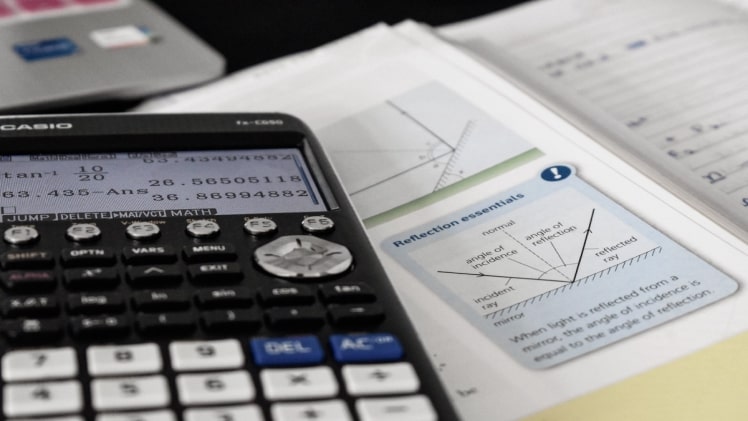Many students wish that the apple had never fallen on Newton’s head, but we all admit that if he hadn’t existed, the basis for modern physics and science wouldn’t have been possible. Physics is all around us but many of us still find it difficult because we have to use knowledge to solve problems instead of using facts directly. If you are looking for a solution to make physics easier, then welcome. This article shares a few tips to learn Physics easily.
-
Visualize the concept
In everyday life, all the technologies obey the laws of physics, and what better way to learn physics than to observe the surroundings around you. Watch the trajectory of a ball or how the pebbles ripple when thrown in the water. These are a few of the concepts from Physics Class 11. Trust your intuition while reading the physics concept. Our brain remembers visual concepts better than theoretical ones. Take your time and understand how the formulas were derived. Visualizing the concepts also makes physics fun.
-
Don’t fall behind on classes
Physics is one of the subjects where previous topics might be connected to the current one. So if you fall behind in a couple of classes, you get lost in an abyss. Hence, try to keep up with the classes and take down notes as and when required. And learning one concept at a time with sufficient time to grasp the concepts helps you remember the concepts better. Pay attention to math class too because physics requires the usage of algebra, trigonometry, and calculus. If your math skills aren’t up to the mark, practice problems every day to become better at them.
-
Read theory
Before jumping right into solving all the massive problems, start with theory because they build a good foundation and help you analyze the questions better. After reading the theory, list down all the formulae and different cases that need to be considered. And If you find a topic interesting, congratulations. Physics might be your friend after all.
-
Break down the situation into easier pieces
When the questions get lengthy, not only do they look complex, but they also make it challenging to comprehend what’s asked in the situation. Breaking it down into simpler pieces will help you analyze the problem better and find hidden pieces of information which might have been neglected otherwise. Start off with writing down given information followed by formulas to be used and then solve the problem section by section and then join the pieces together.
-
Drawing can be helpful
Use drawings and graphics to illustrate a concept during practice and exams. It doesn’t have to be the exact copy of what you might have seen in the textbook, but it can be something you visualized when you read the question. This simple trick will help you in trusting your intuition and will help you remember how everything is connected.
And make flashcards. You can find flashcard-making apps on the App Store and Google Play to make the flashcards faster. Whenever you come across a new formula, jot it down and use it during revision to test your knowledge of that concept. Following this method, every day would help you retain the information longer. Once you are well versed with the formulas, all that’s left is applying them based on the concepts. You can also write cases on the flashcards if necessary.
-
Verify your answers
If a question gets confusing to comprehend or when you solve problems in a hurry, always recheck your steps and ensure that’s what was asked in the question. Try to relate the problems to real-life scenarios, make drawings if necessary. For example, when a ball is dropped from the top of a building, it falls with an acceleration that is equivalent to 9.8 (acceleration due to gravity). Although the ball might bounce back after hitting the ground, check for any additional information in the question to describe it and verify your answer.
-
Use other sources to learn more about Physics
Physics goes way beyond what the textbook can offer. If you are curious about a concept, look up articles on it. Or if you are having a hard time understanding the textbook, use one of the following methods.
- Watch tutorials on studying websites/ YouTube
The tutorials explain the concepts faster and in an easier manner.
2. Joining study groups
Having a studying partner will help you progress in a subject better than you can imagine.
3. Take the help of your physics teacher
Listening to the concept again from an expert is a good way to understand the concepts.
4. Practicing more
Unlike a few easier subjects physics requires a good amount of practice to apply the concepts well. Many websites offer practise problems on each concept to help you figure out if you understood the concept well or not. Solutions of HC Verma Concept of Physics contains solutions to several concepts. Apart from this, at the end of the chapter of every lesson, they are practice problems.
5. Use experiments and work on projects
What better way to apply physics than working on projects and doing experiments. Attend physics lab sessions to enhance the learning experience. A bonus point about physics is that many theoretical concepts of physics can be easily stored in the mind by experimenting with it. You will definitely remember the concepts for a lifetime and enjoy physics too.
6. Hire a private physics tutor
If the above tricks don’t work well, it might be time for you to hire a private physics tutor. Having a great teacher will help you with the foundational physics level and they will teach you many tricks to enjoy physics.
Best wishes.
Plagiarism report
https://smallseotools.com/view-report/d601209379f5b754b3f7bcee960a8b9f

